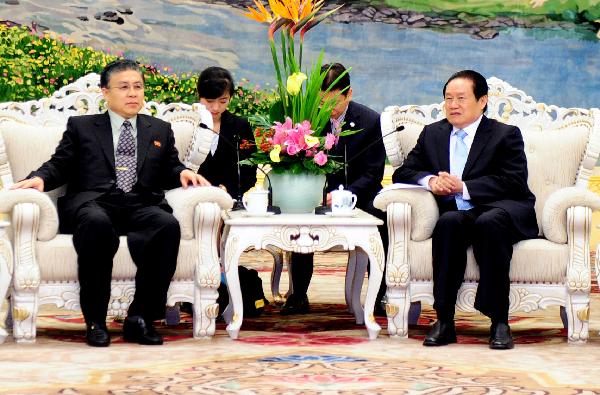Mun Kyong Dok and KWP Provincial Secretaries Visit China

Zhou Yongkang (R), a member of the Standing Committee of the Political Bureau of the Central Committee of the Communist Party of China (CPC) and secretary of the Political and Legislative Affairs Committee of the CPC Central Committee, meets with Mun Kyon Dok (L), an alternate member of the Political Bureau of the Central Committee of the Workers' Party of Korea (WPK) and secretary of the Secretariat of the WPK Central Committee, in Beijing, capital of China, Oct. 19, 2010. (Xinhua/Zhang Duo)
Mun Kyong Dok, Chief Secretary of the Pyongyang KWP City Committee and a central party (CC KWP Secretariat) secretary led a delegation of party provincial and city committee secretaries on a trip to Beijing that arrived last Tuesday. Among the members of Mun’s delegation were the newly appointed Chief KWP Secretaries of Jagang, North Pyongan and Ryanggang Provinces. It is the first occasion where the Korean Workers’ Party dispatched representatives from all of its provincial and municipal committees.

Zhou Yongkang (2nd R), a member of the Standing Committee of the Political Bureau of the Communist Party of China (CPC) Central Committee and secretary of the Political and Legislative Affairs Committee of the CPC Central Committee, meets with a delegation from the Democratic People's Republic of Korea (DPRK), headed by Mun Kyon Dok, an alternate member of the Political Bureau and secretary of the Workers' Party of Korea (WPK) Central Committee, in Beijing, capital of China, Oct. 19, 2010. (Xinhua/Zhang Duo)
In addition to meeting with members of the PRC leadership, Mun and the delegation are studying Chinese economic management and development. Mun Kyong Dok is a former KISYL and OGD official who is directly tied to Jang Song Taek. He was elected to alternate membership on the CC KWP Political Bureau and a CC KWP Secretary during the 3rd Party Conference in September.
Xinhua reports:
“It is the first time that the secretaries from all the WPK provincial and municipal committees have visited China, which by itself highlights the significance that the DPRK and its WPK attach to promoting China-DPRK relations,” Zhou noted.
Zhou also briefed Mun about the just-concluded Fifth Plenary Session of the 17th CPC Central Committee and the nation’s next five-year development plan discussed during the session, saying that China looked forward to working with the DPRK on national construction with the aim of better serving the two peoples.
Mun, who is also the chief secretary of the Pyongyang City Committee of the WPK, said the delegation members had witnessed and been encouraged by the Chinese people’s determination to develop the country during the visit.
“We will study and learn the successful experiences from China and make efforts to support the growth of the friendly ties between the two nations,” Mun told Zhou.
Liu Qi, a member of the Political Bureau of the CPC Central Committee and secretary of the Beijing Municipal Committee of the CPC, also met with the delegation Tuesday evening.
China and DPRK have witnessed frequent high-level exchanges, and increased trade and cultural exchanges this year, which was an important step for furthering bilateral relations, Liu said.
“We believe the new WPK leadership with Kim Jong Il as general secretary will lead the DPRK people to make new progress in building a prosperous country,” Liu told Mun.
Chosun Ilbo reports about Mun’s trip and other PRC interactions, which occur during the 61st anniversary of DPRK-PRC relations (6 October) and the 60th anniversary of the PLA’s participation in the Korean (Victorious Fatherland Liberation War):
The profiles of the Chinese delegation that attended the 65th anniversary celebrations of the North Korean Workers Party were also exceptional. It included senior officials of the three Chinese northeastern provinces — Sun Zhengcai, the secretary of the Jilin provincial party committee, Chen Xi, the deputy secretary of the Liaoning provincial party committee, and Du Yuxin, the deputy secretary of the Heilongjiang provincial party committee.
They were welcomed at Sunan Airport by Ju Yong-sik, the senior secretary of the party committee in Jagang Province, a border region. The senior secretaries of the party committees in all four North Korean provinces bordering China — Ju from Jagang Province, Ri Man-gon from North Pyongan Province, O Su-yong from North Hamgyong Province and Kim Hi-taek from Yanggang Province — attended a dinner that evening in honor of the Chinese delegation.
“There have recently been more signs of the North and China deepening and developing economic cooperation, including various development projects focusing on the border areas,” a Unification Ministry official said. “It seems that after the North’s Workers Party and the Chinese Communist Party finished talks at headquarters level, their provincial party committees have now begun concrete cooperation.”
Military exchanges are also increasing ahead of the 60th anniversary of the day the Chinese joined the Korean War on Oct. 25.
The official North Korean Central Broadcasting Station on Tuesday reported a delegation of Chinese People’s Volunteer Veterans led by Wang Hai, a former Air Force commander, and the People’s Liberation Army’s art troupe arrived in Pyongyang for the anniversary.
O Kuk-ryol, vice chairman of the National Defense Commission, and Pak Jae-kyong, vice minister of People’s Armed Forces, hosted a reception for them.
On Oct. 14, a North Korean Army delegation led by Pyon In-son, another vice minister of People’s Armed Forces, visited China, to tour PLA units. Quoting the North’s official Rodong Sinmun daily, Xinhua said, “Friendship bonded by blood in the previous generations is being handed down to the next generation.”
